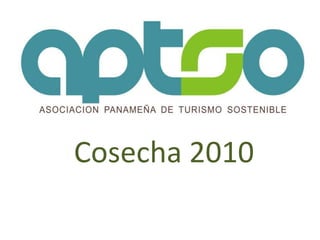Aptso cosechas 2010
- 1. Cosecha 2010
- 2. Cosecha de 2010 â Informe APTSOMiembro activo con voto en CAMTUR.
- 3. Desarrollo del Curso de GuÃas Sostenibles de PanamÃĄ
- 4. Modulos â Conocimiento, InterpretaciÃģn, Liderazgo
- 5. Curso Enteramiento de GuÃas 2010
- 6. 21 GuÃas entrenados y certificados por NAI â CIG
- 7. 21 GuÃas entrenados en conocimiento, liderazgo, seguridad y rescate
- 8. Capacitadores internacionales y expertos locales
- 9. CapacitaciÃģn bÃĄsica en turismo sostenible para miembros de ARUG en el golfo de Chiriqui.
- 10. Alianza estratÃĐgica con MarViva para apoyo en programas de turismo en el golfo de Chiriqui
- 11. Participacion en el consejo de trabajo de CAMTUR para programa de certificaciones turisticas Desarrollo del Curso de GuÃas Sostenibles de PanamÃĄDevelopment of Modules and Individual CoursesKnowledge (120 Hours) The modules within this section pertain to all the information of which a guide should have a solid foundation.Interpretation(40 Hours)By completing this module each participant will receive certification as an interpretive guide through the internationally recognized, National Association for Interpretation. Leadership â (56 Hours)A guide can be extremely knowledgeable and a talented presenter; however they also need to exhibit leadership skills that reflect their ability to handle individual problems, group dynamics, and emergency situations, among the many other issues that arise working in this environment. This module will cover Guiding Basics â Ethics and Etiquette, Leadership and Teambuilding, Wilderness First Aid, and CPR.
- 12. Knowledge â Natural HistoryNatural History - 64 HoursThe individual subjects within the Natural History Module were taught as day long courses. The first half of the day was spent in lecture, while the afternoons were spent in the field observing what was discussed in the classroom. This course was designed to provide the student with a sound foundation in ecological concepts as applied to tropical rain forest ecosystems. The material covered is equivalent to a university upper level course in tropical field ecology. A full day of lecture and field work was dedicated to the following topics: Impact of the Isthmus - Geography, Climate, Biodiversity, Rainforest & Canopy Ecology, Mammalogy, Ornithology, Herpetology, Entomology, Botany, and Marine Ecology .
- 13. Knowledge â Cultural HistoryCultural History â 56 HoursThe individual subjects of the Cultural History Module were taught during a eight day period by experts in their fields of study. A full day of lecture and field work was dedicated to the following topics: History of Panama, APTSO, STRI, USAID, Fundacion Avifauna, UNESCO, RAMSAR & Important Bird Areas, CIAM - Presentations & Environmental Law, Sociology - Modern & Provincial Panama, Folklore, and Ethnic Groups of Panama â Embera, Ngabe, Kuna, and Afro Descendents.
- 14. Interpretation â NationalAssociationforInterpreters (NAI)CertifiedInterpretive Guide (CIG)Interpretationâ 40 hours Interpretation encompasses all the skills that a guide needs to communicate his knowledge and passion to the visitors. Without Interpretation, the information provided by the guide is little more than a collection of dry facts. The National Association for Interpretation (NAI) was formed in 1988 from two existing organizationsâthe Association of Interpretive Naturalists and the Western Interpreters Association. Both of those groups were created in the 1950s to provide training and networking opportunities for interpreters of natural and cultural history in non-formal settings (parks, zoos, nature centers, museums, and aquaria). After merging to form NAI in 1988, a partnership was created with Colorado State Universityâs Department of Natural Resource Recreation and Tourism. CSU students work in the NAI office as interns and work-study employees. NAI strives to meet the needs of interpretation professionals in North America and worldwide. Its certification program is one of many services designed to further the work of the profession.
- 15. Leadership & TeambuildingLeadership and Team Buildingâ 16 hoursDuring this two day program camping in Altos de Maria coordinated through âLetâs Camp â Empower your Employeesâ, participants learned and practiced through live situations the concepts of; leadership, attitude, preparedness, decision making, responsibility, communication, team work, conflict resolution, stress management, and organizational skills.
- 16. Wilderness First Aid & CPRWilderness First Aid & CPRâ 24 hoursCertain self-limiting illnesses or minor injuries may not require further medical care past the first aid intervention. It generally consists of a series of simple and, in some cases, potentially life-saving techniques that an individual can be trained to perform with minimal equipment. In this three day course, participants were taught first aid techniques through simulations of rescues in the field and CPR. Certificates were issued by the Panama Red Cross.
- 17. ARUG â CapacitacionBasica en Turismo Sostenible Entrenamiento a comunidades en Bocas del Toro, Azueroy ChiriquÃ. CapacitaciÃģnydistribuciÃģn de guÃas de turismosostenible a miembros de diversascomunidadesruralesquedeseantomarventaja del turismo en PanamÃĄ.
- 18. MarViva - Alianza estratÃĐgica en Golfo ChiriquiCompromiso en sensibilizaciÃģn y capacitaciÃģn para el turismo sostenible en las comunidades del Golfo de Chiriquà y ÃĄreas en donde Marviva y APTSO tengan proyectos en conjunto.Apoyo a la gestiÃģn de las Ãreas Marinas Protegidas (AMP), en las zonas de trabajo de FundaciÃģn MarViva para impulsar el turismo sostenible como un mecanismo de financiamiento y de sensibilizaciÃģn.
- 19. Financial InformationMembers & Benefactors Patrocinio para proyectos de EducaciÃģn por USAID: $20,825.00MembresÃa de APTSO: $625.00Curso de APTSO, alquiler de local, capacitadores, materiales acadÃĐmicos, coordinador de curso, capacitaciones de campo: $25,757.00
- 20. MembresÃa a CAMTUR: $670.00FundaciÃģn Avifauna maneja los fondos de APTSO.











